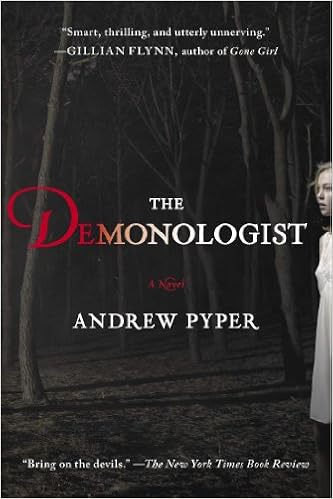Even as I write this, I close my eyes and try to focus in on exactly what the problem was with this book. The writing was okay. It wasn't terrible - I remember liking the way that Venice as a city is described, saturated with art, beauty, and death - that is generally how I think of Venice. And I liked the bit about turquoise being the color of grief, connecting it to different memories. There was definitely a literary quality to the book's sensibility, despite the jarring, frequent fragmenting of sentences for dramatic effect that felt clunky and artificial, almost pretentious, you might say. (See how long that sentence was? I'm damn proud of things like that). Though that wasn't what really nagged at me as I read.
What confused me is that I don't really know what kind of a book The Demonologist is supposed to be. That is, I don't know who its target audience is. It wasn't "thrilling:" road-trips through Bumblefuck, America seldom are, and the protagonist is a rather dull, weak figure. Not that weak can't be interesting, but it just wasn't here. The Milton scholar David Ullman could have been galvanized into being a man of action-so many professors become that in literature, but none of his decisions made a whole lot of sense. They were just necessary to move the plot along, and so in that way the story felt forced, rather than compelling. Also, the recording Ullman makes of a possession at the beginning of the film is made out to be this end-all-be-all proof of demons, and thus becomes a crux of the story, but in such tales, nothing ever works like that. Suggesting that such a document would function as a world-altering proof stretched my imagination too far, so its influence over characters and their decisions felt inauthentic and misplaced.
If the book was written as horror, then it was too safe to be good. I have seen/read a damn good share of what is out there in terms of the demonic/satanic/possession sub-genre, and none of the "horrific" things Ullman encounters along his journey were new to me. They weren't even close to being new. Which, at least for me, is a hallmark of good horror: innovation. A twisting of tropes, a push to extremes-that to me is what moves the genre forward. The scenes presented all felt rather neat and tidy, even predictable. I wasn't disturbed even a fraction of what I suppose I was intended to be. Which begs the question: who was this written for? Hard-core horror fans are not going to find anything here to salivate over, but the completely un-initiated would probably dismiss a book like this as "not their cup of tea." Perhaps there's an in-between group, people who might potentially be interested in dark fiction, but don't know any better?
It is troubling. Most troubling of all was the happy ending that came out of absolute nowhere. It made no sense plotwise, it certainly wasn't earned, it most definitely was unnecessary, and it goes against the grain of the genre in a stupid, rather lame "none of this really matters because it's all going to be okay" sort of way. It's the kind of "safe" story that makes me want to puke.
Now, back to Season 2 of Netflix's Slasher, to get my head back on straight.
K Rating: 1/5

No comments:
Post a Comment